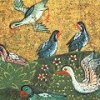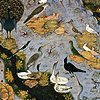(5 minutes)
these stories are "nested" in Rumi;
you can see how the fish
story "frames" the bird story
in a poetic verison by Coleman
Barks
 There was in a
secluded place a lake, which was fed by a running stream, and in this lake were
three fishes, one very wise, the second half wise, and the third foolish. One
day some fishermen passed by that lake, and having espied the fish, hastened
home to fetch their nets. The fish also saw the fishermen and were sorely
disquieted. The very wise fish, without a minute's delay, quitted the lake and
took refuge in the running stream which communicated with it, and thus escaped
the impending danger. The half wise fish delayed doing anything till the
fishermen actually made their appearance with their nets. He then floated upon
the surface of the water, pretending to be dead, and the fishermen took him up
and threw him into the stream, and by this device he saved his life. But the
foolish fish did nothing but swim wildly about, and was taken and killed by the
fishermen.
There was in a
secluded place a lake, which was fed by a running stream, and in this lake were
three fishes, one very wise, the second half wise, and the third foolish. One
day some fishermen passed by that lake, and having espied the fish, hastened
home to fetch their nets. The fish also saw the fishermen and were sorely
disquieted. The very wise fish, without a minute's delay, quitted the lake and
took refuge in the running stream which communicated with it, and thus escaped
the impending danger. The half wise fish delayed doing anything till the
fishermen actually made their appearance with their nets. He then floated upon
the surface of the water, pretending to be dead, and the fishermen took him up
and threw him into the stream, and by this device he saved his life. But the
foolish fish did nothing but swim wildly about, and was taken and killed by the
fishermen.
 The wise man is he who possesses a torch of his own;
The wise man is he who possesses a torch of his own;
He is the
guide and leader of the caravan.
That leader is his own director and
light;
That illuminated one follows his own lead.
He is his own protector;
do ye also seek protection
From that light whereon his soul is
nurtured.
The second, he, namely, who is half wise,
Knows the wise man to
be the light of his eyes.
He clings to the wise man like a blind man to his
guide,
So as to become possessed of the wise man's sight.
But the fool,
who has no particle of wisdom,
Has no wisdom of his own, and quits the wise
man.
He knows nothing of the way, great or small,
And is ashamed to follow
the footsteps of the guide.
He wanders into the boundless
desert,
Sometimes halting and despairing, sometimes running.
He has no
lamp wherewith to light himself on his way,
Nor half a lamp which might
recognise and seek light.
He lacks wisdom, so as to boast of being
alive,
And also half wisdom, so as to assume to be dead.
That half wise
one became as one utterly dead
In order to rise up out of his
degradation.
If you lack perfect wisdom, make yourself as dead
Under the
shadow of the wise, whose words give life.
The fool is neither alive so as to
companion with Isa, [=Jesus]
Nor yet dead so as to feel the power of Isa's
breath.
His blind soul wanders in every direction,
And at last makes a
spring, but springs not upwards.
see a poetic version by Coleman Barks
 A man captured a bird by wiles and snares;
A man captured a bird by wiles and snares;
The bird said to him,
"O noble sir,
In your time you have eaten many oxen and sheep,
And
likewise sacrificed many camels;
You have never been satisfied with their
meat,
So you will not be satisfied with my flesh.
Let me go, that I may
give you three counsels,
Whence you will see whether I am wise or
foolish.
The first of my counsels shall be given on your wrist,
The second
on your well-plastered roof,
And the third I will give you from the top of a
tree.
On hearing all three you will deem yourself happy.
As regards the
counsel on your wrist, 'tis this, -
'Believe not foolish assertions of any
one!' "
When he had spoken this counsel on his wrist, he flew
Up to
the top of the roof, entirely free.
Then he said, "Do not grieve for what is
past;
When a thing is done, vex not yourself about it."
He continued,
"Hidden inside this body of mine
Is a precious pearl, ten drachms in
weight.
That jewel of right belonged to you,
Wealth for yourself and
prosperity for your children.
You have lost it, as it was not fated you
should get it,
That pearl whose like can nowhere be found."
Thereupon the man, like a woman in her travail,
Gave vent to
lamentations and weeping.
The bird said to him, "Did I not counsel you, saying,
'Beware of grieving over what is past and gone?'
When 'tis past and gone,
why sorrow for it?
Either you understood not my counsel or are deaf.
The
second counsel I gave you was this, namely,
'Be not misguided enough to
believe foolish assertions.'
O fool, altogether I do not weigh three
drachms,
How can a pearl of ten drachms be within me?"
The man recovered himself and said, "Well then,
Tell me now
your third good counsel!"
 The bird replied, "You have made a fine use of the others,
The bird replied, "You have made a fine use of the others,
That
I should waste my third counsel upon you!
To give counsel to a sleepy
ignoramus
Is to sow seeds upon salt land.
Torn garments of folly and
ignorance cannot be patched.
O counsellors, waste not the seed of counsel on
them!"
see a poetic version by Coleman Barks
Great: you are finished with the reading! Make sure you can answer these final questions:
Source: Unless otherwise noted, the readings come from Rumi's Masnavi, translated by E. H. Whinfield (online in pdf format at Omphaloskepsis). This version of the text is provided for your printing convenience. Reading comprehension questions have been added after each section.
|
Modern Languages / Anthropology 3043: Folklore &
Myth. |
|